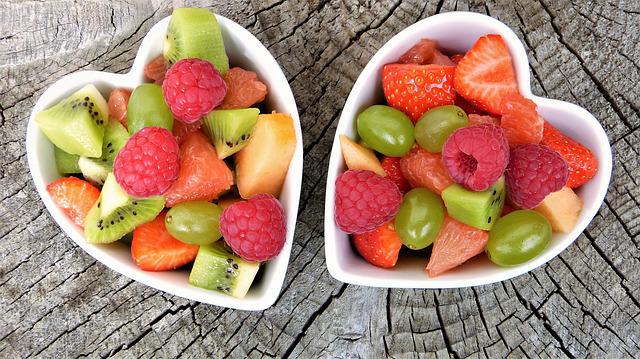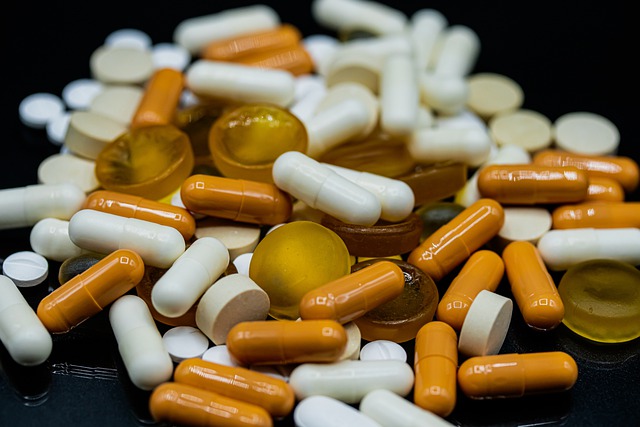In an era where everybody wants a thick and lustrous beard, compromising with a patchy, thin beard is difficult. Consuming vitamins for beard growth naturally could be a solution.

Although, beard growth depends on factors like hormonal balance, beard care regime, smoking habits, sleep pattern, beard dandruff problems, and many more.
But a balanced diet plays a crucial role by providing vitamins and minerals to our facial hair.
Some micronutrients like vitamins A, B, C, D, E, Biotin, magnesium, omega-3, calcium, iron, selenium, and zinc are mandatory minerals and vitamins that promote beard growth.
Nowadays, maintaining a balanced diet for proper micronutrients is difficult.
Firstly, we do not have time to eat different varieties of food for various micronutrients.
Secondly, food adulteration has increased. We do not get proper nutrition through our food.
So, should we start popping beard growth supplements or capsules?
No!
Finding an easy solution may require only money, but we are searching for a permanent solution.
What kind of permanent solution?
Eat a balanced diet daily to overcome your deficiency through vitamins and minerals.
We cannot do anything with the adulteration of food until we know how to grow them naturally.
But we can certainly avoid supplements and capsules that might give you instant relief but cost you worse.
Here we will discuss the vitamins for beard hair growth, intake, and natural resources of those vitamins.
Read the entire blog on vitamins for beard growth and then decide whether you should try beard growth pills or not.
Table of Contents
What are beard growth vitamins?
The collective group of vitamins that help to improve complete beard health and boost keratin synthesis in the body is known as beard growth vitamins.

These vitamins help to control beard hair fall, moisturize the skin underneath, reduce inflammation, rejuvenate hair follicles, and give a soothing effect.
Many beard care products on the market can achieve similar results, but we believe the results are only temporary. You will get cured only when you fix things from within.
Best Vitamins for beard growth:
Vitamin A
Vitamin A is a group of fat-soluble retinoids responsible for crucial functions such as eyesight, immune function, and cell development and differentiation.
Studies show that vitamin A is found in both plant and animal diets. The acceptable limit for vitamin A intake for an adult is 1300 mcg per day.
Exceeding the ingestion limit can lead to vitamin A toxicity and can cause hair loss.
How does vitamin A help with beard growth?
Vitamin A is responsible for producing sebum and cell growth. Sebum is an oil that keeps skin moisturized and prevents hair dryness and breakage. It also keeps the luster of the beard.
Vitamin A deficiency can affect the process of building new cells in the body that will cause hair follicles damage. The low percentage of sebum cause skin dryness and hair breakage.
Food sources rich in Vitamin A:
Foods rich in vitamin A:
Foods rich in vitamin A are liver, carrots, green and yellow vegetables, cod liver oil, peaches, spinach, tomatoes, broccoli, egg yolks, papaya, mangoes, cabbage, etc.
Vitamin B
The B vitamin complex consists of eight water-soluble vitamin substances: thiamine (B1), riboflavin (B2), niacin (B3), pantothenic acid (B5), vitamin B6, biotin (B7), folic acid, and vitamin B12.
Vitamin B helps in cell metabolism. Each substance can easily reach daily allowance through a balanced diet except for biotin. Biotin is the only vitamin produced by the body.
Out of them, vitamin B2, vitamin B3, Biotin, folate, and vitamin b12 are associated with hair growth. So we will discuss only them.
- Vitamin B2:
Vitamin B2 (riboflavin) is involved in fat metabolism, cell development, and energy production. The body stores small amounts of this vitamin in the liver, kidneys, and heart.
The deficiency of vitamin B2 can promote hair loss.
- Vitamin B3(Niacin):
Niacin is involved in blood circulation and keeps the skin and various body systems healthy. This vitamin also helps in hormone production, including testosterone (required for beard growth). Niacin deficiency can also affect hormones and hair health.
- Vitamin B7(Biotin):
Biotin is involved in fatty acid, glucose, and amino acid metabolism. It also helps in histone modification, cell signaling, and gene regulation. Dietary biotin is found primarily in protein, while free biotin is stored in the small intestine and liver.
The allowance limit to ingest biotin is 30 mcg/day.
How does biotin help with beard growth?
Biotin helps in keratin synthesis. Keratin is a protein beneficial for hair, nails, and outer skin health. It is also present in your glands and organs.
Keratin, a hair-building block, absorbs into the hair cuticle to give it strength and shine from within and to prevent frizz.
- Folate:
Folic acid is a water-soluble vitamin located in blood plasma and the liver. It is responsible for the nucleic acid synthesis and amino acid metabolism.
The recommended daily intake of folic acid for adults is 400 mcg, and the tolerable dosage is 1000 mcg. A lack of folic acid can lead to changes in your hair, nails, and skin.
- Vitamin B12:
Vitamin B12 is involved in DNA synthesis, nerve function, and red blood cell formation.
The recommended dietary allowance is 2.4 µg for adults, and due to the low toxicity potential, no upper limit for vitamin B12 intake has been established.
It suggests that folic acid and vitamin B12 help rejuvenate new hair follicles.
Food sources rich in Vitamin B:
Anchovies, salmon, egg yolk, oyster, soybeans, bread, legumes, chicken breast, mushrooms, cauliflower, whole grains, Moringa, Red Clover, wheat germ, peanuts, walnuts, and almonds are some rich sources of vitamin B.
Vitamin C
Vitamin C is a water-soluble vitamin and antioxidant that helps to prevent the oxidation of low-density lipoproteins and free radicals damage.
It is responsible for collagen fiber synthesis and intestinal absorption of iron.
Humans are born deficient in enzymes responsible for vitamin C synthesis. Thatswhy, we have to take it through our daily diet.
How does vitamin C help with beard growth?
As we have discussed, Vitamin C aids in collagen production and aids in beard growth. Apart from that, it improves blood circulation and sebum production.
Sebum helps the skin retain moisture. It is crucial for healthy beard growth.
Food sources rich in Vitamin C:
Citrus fruits, potatoes, tomatoes, green peppers, cabbages, green bell pepper, pineapple, guava, kiwi, and kale are some sources of vitamin C.
Vitamin E
Vitamin E is accountable for oxidant/antioxidant balance and helps to protect against free-radical damage. It helps in hair growth, improving eyesight, and anti-aging skin effects.
Orally taking vitamin E for a beard can help you in several ways, but it can be used topically. It helps to boost blood circulation in that area, improves follicle health, and repairs damaged follicles.
Its anti-aging effects are renowned for preventing tissue decay and building new skin tissue.
How does vitamin E help with beard growth?
Vitamin E is a powerful antioxidant that lowers inflammation and improves blood circulation and oxygen supply. It also repairs damaged hair follicles. Ultimately it helps in facial hair growth.
Food sources rich in Vitamin E:
Almonds, seeds, avocados, broccoli, nuts, sweet potatoes, soybeans, and leafy veggies are foods rich in vitamin E.
Vitamin D
Vitamin D is a fat-soluble vitamin synthesized in the epidermis. It is responsible for anti-inflammatory and immunoregulatory effects in our bodies. Also, it maintains serum levels of calcium and phosphorus in our bodies.
Does the sun make your beard grow faster?
We can say not directly, but somehow it helps. Vitamin D helps in improving hormonal balance and triggers testosterone production.
Testosterone is directly related to facial hair growth. It rejuvenates hair follicles and helps in thicker beard growth.
It is a say that spending 15-20 minutes in sunlight is enough for our daily dose. Still, people get deficient during winters and monsoons, so it is required to fulfill the requirement through diet.
Food sources rich in Vitamin D:
Liver, dairy products, nuts, halibut, mackerel, eel, salmon, whitefish, swordfish, maitake mushrooms, and portabella mushrooms are a few sources of vitamin D.
How to take beard growth vitamins naturally?
I know it is impossible to include everything in your diet for proper nutrition. But guys, people have immense knowledge on this topic. We should not hesitate to consult a nutritionist and have a diet chart.

They will include each vitamin in your diet without letting you know. So my first recommendation would be to consult a nutritionist and have your balanced diet chart.
If following a diet is difficult for you. You can change a few things accordingly under consultation. They have a lot of replacements.
My second recommendation would be to (if not consulting a nutritionist) try to maintain an adequate dosage of vitamins. Because having them in the upper limit will affect you badly.
According to WebMD dosage list of vitamins for beard growth:
| Vitamins | Recommended Dietary Allowance (RDA) or Adequate Intake (AI) | Upper Tolerable Limit (UL) |
| Vitamin A | Men: 900 mcg/day | 3,000 mcg/day |
| Vitamin B3 (Niacin) | Men: 16 mg/day | 35 mg/day |
| Vitamin B6 | Men age 19-50: 1.3 mg/day Men age 51 up:1.7 mg/day | 100 mg/day |
| Vitamin C | Men: 90 mg/day | 2,000 mg/day |
| Vitamin D | Age 1-70: 15 mcg/day | 100 mcg/day |
| Vitamin E | 15 mg/day | 1000 mg/day |
| Folic Acid (Folate) | 400 mcg/day | 1,000 mcg/day |
Do beard growth vitamins work?
Beard growth vitamins work only when your gut health is good. Since we are not talking about any beard growth pills or capsules, we want vitamins from food to absorb properly in the body.
We are too busy, and we do not have time to eat. But replacing food with supplements is not correct. We humans are not born for pills. We are structured in a way to heal ourselves naturally.
If your stomach works properly, if you do not have any digestive aids, then, believe me, beard growth vitamins works. You only need to follow a few rules to make your gut health stronger:
- Exercise daily
- Avoid junk food
- Drink plenty of water
- Sleep properly
- Avoid eating after 6 pm
- Avoid smoking and drinking
- Try to eat plant-based products
If you follow all the above rules, your gut health will improve, and ultimately beard will grow thicker.
What are beard growth supplements?
Beard growth supplements or beard growth capsules are nothing but a combined form of all the vitamins and minerals required for beard growth.

I am not declaring whether it is good or bad. Sometimes your beard becomes thin and patchy because of genetics and age, and you need a supplement.
Curing or improving a genetic issue is difficult through a balanced diet.
Supplements for beard growth can revitalize and strengthen hair follicles in a minimal time and can help avoid a patchy, thin beard.
If you do not have any genetic issues, you must dive into the natural permanent way, which is a balanced diet.
I would say before taking any supplement, consult a doctor or you can try beard growth gummies. Do not randomly pick any overhyped product and start consuming it.
Side effects of supplements for beard growth
Sometimes it becomes mandatory to take beard growth capsules. But you must know how these beard growth supplements can affect your body.

It could be because of an overdose or the unsuitability of the supplements. Side effects are:
- Skin rashes
- High blood sugar
- kidney
- Digestive aids
- Vitamin deficiency
- Palpitations
Why a balanced diet over supplements?
As we discussed, humans are structured in a way to heal ourselves. When you find a cut, it gets cured within a few hours because we have platelets that instantly work.
Similarly, if we have beard hair fall or thinning, we can treat it internally through our diet. We do not need to apply anything or take pills for it.
Sometimes it could be a genetic issue or age factor, where you must take consultation. But relying on beard growth pills completely for thicker growth is not correct.
Prolonged use of these pills can affect your organs like kidneys, heart, and many more. It would be better to consider a balanced diet over beard growth supplements.
Conclusion: Beard growth vitamins
You might get a piece of complete information on vitamins for beard growth through this blog. Beard growth vitamins are the only solution to improve your hair follicle health, skin health, and thick beard growth. It works internally and cures everything.
Now it’s up to you whether you want to stick to your beard growth supplements or you want something natural from your life that lasts forever.
FAQS:
What vitamins help beard growth?
Vitamins like vitamins A, B, C, D, and E and minerals like iron, magnesium, omega-3, calcium, selenium, and zinc are helpful in beard growth.
Do not try to have them through supplements. Instead, take them naturally through a balanced diet.
How do I grow a thicker beard?
You have to follow a balanced diet, exercise daily, and maintain a proper beard regimen for the thick beard.
Remember you do not have beard issues like beard dandruff or beard hair fall. If so, you need to consult a dermatologist before anything.
Why can not I grow a beard at 30?
You need to check where things are going wrong. It could be a genetic factor, hormonal factor, or issues like beard dandruff, beard thinning or your bad daily routine affecting your beard health.
Does no beard mean low testosterone?
It could be a possibility behind a no beard. There are many more reasons behind no beard, like young age, genetic problems, smoking habits, or other beard issues.
Reference:
- Hind M. Almohanna, Azhar A. Ahmed, John P. Tsatalis, Antonella Tosti, Mar 2019; The Role of Vitamins and Minerals in Hair Loss: A Review-https://www.ncbi.nlm.nih.gov/pmc/articles/PMC6380979/
- Yousef I Hassan, Subhashinee Sk Wijeratne, November 2008; Biotin and biotinidase deficiency – https://pubmed.ncbi.nlm.nih.gov/19727438/
- Sabrina Felson, July 2020; vitamins & minerals how much should you take- https://www.webmd.com/vitamins-and-supplements/vitamins-minerals-how-much-should-you-take
Kayden is an entrepreneur, writer, hairstylist working in a professional salon. He specializes in men’s grooming. He loves to blog about beards, hairstyles, and skincare.